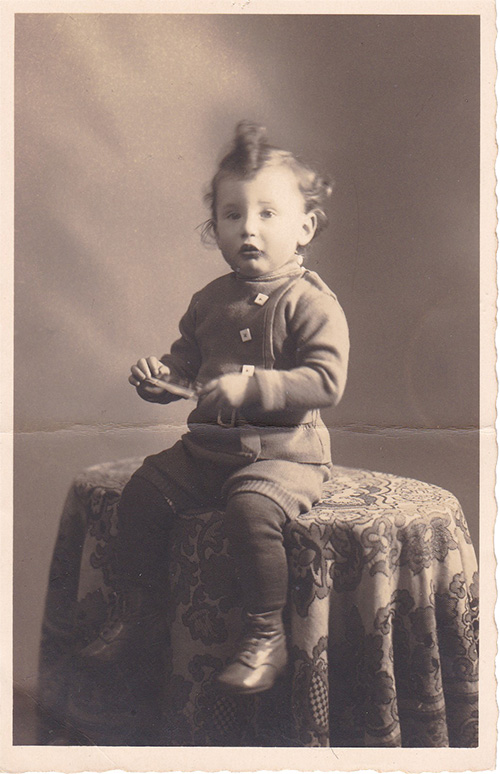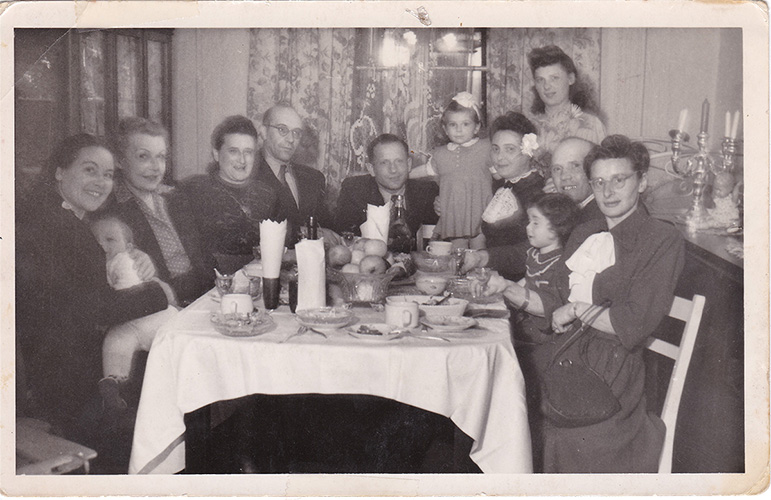Nesche Billig Schattner
Biography
Nesche Billig was first touched by the war before she was a teenager. Born in 1901 in Brody, Austria, in a region known as Galicia, she was the youngest of seven children. Her father had a lucrative wholesale business exporting horsehair and feathers. The family fled to Vienna at the outbreak of World War I, just ahead of the anticipated Russian invasion.
Nesche finished high school and business school in Vienna. The disturbances across the border in Germany in the 1920s and early 1930s were too distant to detract from the vibrancy of the city. Nesche’s loves – opera, theater, and five o’clock tea with friends – seemed beyond the reach of the rising Nazi party.
In 1932, Nesche met Friedrich (Fritz) Schattner through mutual friends. They married eight months later, and Nesche soon had a place in Fritz’s business selling paints and home furnishings. That store, along with the mental and physical barrier Nesche and so many other young Viennese had erected between Austria and the so-called Third Reich, were shattered in 1938 when the Nazis invaded Vienna.
Fritz had a sister in New York, and hurriedly applied for a US visa. Nesche would later describe waiting to learn the results of their application as “a bad dream.” Meanwhile, life in Vienna was an even more intolerable reality. Fritz’s business was plundered in November 1938 during the events of Kristallnacht, including the money saved to secure Fritz and Nesche’s passage to New York, if and when the US granted their visa applications. Fritz was dragged out of the store, arrested, and taken to Dachau. It is unclear how, but Fritz was released as long as he reported daily to the police.
Fortunately, in March 1939, the British government softened its stance toward refugees of Nazi persecution. Fritz was among those selected to be brought to the Kitchener Camp in Richborough, just across the English Channel from France. Nesche was allowed to enter the UK several months later, but only on the conditions that she and Fritz had viable prospects to emigrate to another country and that she would work as a domestic. Nesche was sent to a Jewish family in London that owned a candy store. She remembered the family fondly, recalling that they treated her like their own and welcomed her husband when he was allowed to visit on weekends.
Nesche’s niece and nephew, Rita and Ernst Billig, arrived in England on the Kindertransport one day after Nesche – her brother, Abisch, was interred in Switzerland, and her sister-in-law was sick in Vienna. Rita and Ernst were placed with Christian sponsors in nearby Coventry, but Nesche understood that she was now responsible for her brother’s children. She communicated regularly with their new families via letters, using a dictionary to compose her words.
The US approved Nesche and Fritz’s visa applications in March 1940. In New York, they stayed with Fritz’s sister, but with Fritz struggling to find work, Nesche sought the help of her mother’s brother, Jacob Shiland, who offered her and Fritz jobs in Birmingham at Star Supermarket. Nesche had planned to send for her niece and nephew after settling in the US, but with the escalation of war, remaining in England appeared a safer option.
Although life in Birmingham was easier than in New York – friends, family, and a small but vibrant Jewish community – Nesche could not forget her charges in England. Every week, she would gather war-rationed items such as fruit, tuna, and candles, and ship Rita and Ernst as much as she could fit in a box under the 5-pound weight limit.
When the war was over, Nesche and Philip turned to a local attorney, Abe Berkowitz, and were able to bring Rita and Ernst to Birmingham. Their father, Abisch, reunited with them in Birmingham in 1947, but stayed only briefly before moving on to New York. He was soon joined by Rita, who never felt quite at home in Birmingham. Nesche and Fritz adopted Ernst, providing him the legal standing to attend public schools.
Abisch and their sister Gustie were the only members of Nesche’s family that survived the Holocaust. Reflecting on a life that included so much loss and fragmentation, Nesche spoke of gratitude: “I have what I need, and I need what I have.”
Photos & Documents
More Information
When Nesche Billig was born, Brody was part of Galicia, which was part of the Austro-Hungarian Empire.
After WWI, Brody became part of Poland.
In 1939, Brody became part of the Soviet Union.
Today, Brody is in Ukraine.
Youngest of seven siblings:
Abisch (Adolf) Billig (Cheine Gittle “Gusti” Silber, Amalia Marta Hanfling Roth)
(January 7, 1892 Brody, Poland – March 23, 1981 New York, NY)
Gustie Billig (Heinrich Mayer)
Friedrich (Philip) Schattner
(February 2, 1902 Roznow, Poland – February 4, 1993 Birmingham, AL)
Married February 26, 1933 in Vienna, Austria
Experienced World War I and II in Vienna
Immigrated to England on a domestic visa because her husband was in the Kitchener Camp
Sponsored the US immigration of her brother’s children, Ernst Billig and Rita Billig, after the war







